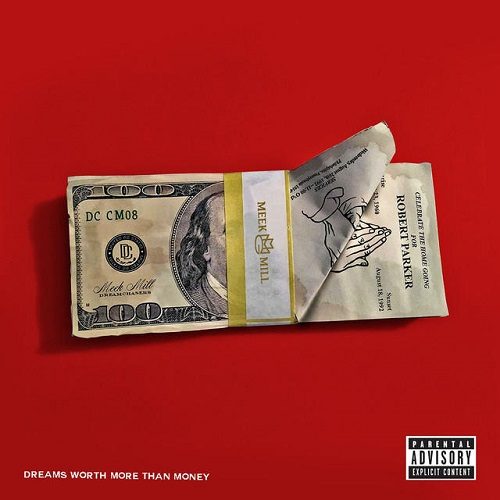Meek Mill’s second album “Dreams Worth More Than Money” seems perfectly coherent, yet makes little sense. The hitherto kinetic rapper sounds as though someone switched his regular coffee for decaf, and the ‘street’ within him has subsequently been kicked to the curb. Joe Budden’s idiotic comments over the weekend about MM – Joe always comes across as a sulky, sexually frustrated teenager, even at 34 – were clearly inappropriate; but having listened to DWMTM now, you can at least slightly understand what he meant (albeit in his inevitably clumsy way). After 54 minutes, you get the feeling that Mill perhaps took those court-ordered eloquence classes a bit TOO seriously. He’s less “Philly Cheese Steak” and more cheese and cucumber sandwich, afternoon tea and watching the polo.
The album – depending on what you look for – is always very professional, consistent and polished. It also lacks identity, purpose and meaning. There are plenty of nice songs, it makes for a pleasant background listens. It’s almost like he’s about to meet his future in-laws and wants to make a good impression (“Why yes, I did see the Mozart concert last Wednesday!”). For the most part, gone are the fiery verses, the classic catchphrases and that lung-busting delivery. Replacing all of that, we find obliging guests (Drake and Nicki Minaj, who outdo the host without breaking sweat), an endless stream of unimaginative 90s references (Biggie, Diddy, Pac) and a raw talent that now smells overcooked.
At this point, you’d be forgiven for thinking I hated listening to DWMTM – not at all. It may leave no lasting impression, but remains extremely competent throughout. It simply feels far too safe from an artist at his best when taking risks, going completely over the top. There are some great flows (Meek can certainly switch lanes with ease) and it opens strongly, with some interesting musical ideas over the first few tracks (the initial Mozart sample, Bangladesh’s diverting beat on “Classic”). “Jump Out the Face” is the first misstep, and is quickly followed by a lukewarm lead single “All Eyez On You” (which may as well have been called “The Notorious P.A.C.”).
Drake kills it on “R.I.C.O.” (Meek does a good job, too) but a couple of tracks later, the terrible “Ambitionz” turns up (that little “z” should tell you everything you need to know). “Pullin’ Up” sounds like cheap version of The Weeknd’s track from “50 Shades” but the quality level ascends soon after (“Check” and “Been That” should probably have opened the LP). “Bad For You” is abysmal (you just start to feel sorry for Nicki at this point), but the Danja beat on “Stand Up” is excellent. It ends with Diddy ranting unintelligibly about money).
Listen, we get it. Nobody wants to be known as a one trick pony. Transition is difficult in the best of circumstances (just ask Minaj on “The Pinkprint”). But listening to DWMTM is like taking a racing driver and putting them in a tractor: sure, it would be kinda fun to watch them tear up a corn field for a minute, but you couldn’t hack an hour of it. You barely get any social commentary (it’s not like Black America is lacking in pertinent subject matter); you get saccharin lullabies with his (vastly superior) girlfriend; you don’t get much of what got him there. This is one to spin a couple of times, then never again.

